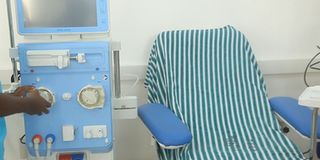How 113 new dialysis machines will cut treatment costs

What you need to know:
- The machines, worth Sh31.76 million each, have already been installed in several regional referral hospitals
Dar es Salaam. The Medical Stores Department (MSD) has delivered 113 SWS 6000 dialysis machines to 14 hospitals across the country, a move expected to reduce the cost of dialysis treatment from Sh250,000 to Sh150,000.
The machines, worth Sh31.76 million each, have already been installed in several regional referral hospitals, offering enhanced functionality, compatibility with various reagents and the ability to provide multiple services to patients simultaneously.
The Dialysis Unit head of nursing at Dar es Salaam’s Temeke Regional Referral Hospital, Abubakari Suleimani Ali, said on Friday, December 27, that the new machines had improved patient care.
He explained that, unlike older models, the new machines allowed for continuous treatment even if a patient experienced challenges such as blood pressure fluctuations or changes in blood sugar levels.
“The machines have a 'double pump' feature, which allows us to keep the treatment running while addressing possible challenges. The newer machines do not discriminate against certain reagents, making setup quicker and easier,” he said.
The hospital’s internal medicine specialist, Dr Emmanuel Lazaro, commended the government for procuring efficient machines over the past six months.
He noted that the machines had helped reduce congestion at Muhimbili National Hospital, previously the primary provider of dialysis services.
“Since we began using these machines on June 14, 2024, we’ve seen no malfunctions. The machines can run continuously, unlike the older ones that would often stop mid-treatment,” said Dr Lazaro.
“We can also use any type of reagent, which allows us to keep costs low and maintain high-quality service,” he added.

The Dialysis Unit head of nursing at Dar es Salaam’s Temeke Regional Referral Hospital, Dr Abubakari Suleimani Ali, demonstrates the performance of one of the new SWS 6000 machines that are expected to significantly improve dialysis services to patients in the city. PHOTO | COURTERSY
Further, Dr Lazaro said that the new equipment had significantly increased the hospital’s capacity, allowing them to treat up to 36 patients per day, compared to the previous 10 patients per day.
The hospital’s director Joseph Kimaro, expressed gratitude for the government’s investment in healthcare.
He emphasised that the flexibility of the machines had enabled the hospital to source affordable supplies from various suppliers, reducing operational costs.
“Although some patients receive free services, the hospital has generated Sh60 million from these machines,” said Dr. Kimaro, adding that the equipment is user-friendly and prevents disputes with suppliers.
To date, the hospital has conducted 247 dialysis sessions, easing the burden on MNH, where patients previously had to wait in long queues for treatment.
MSD’s Director General, Mr Mavere Tukai, assured that the department was ready to meet the demand for additional dialysis machines and reagents.
He urged healthcare centres to prepare for the installation of these advanced machines, which would further reduce the cost of life-saving dialysis treatment.
“We are planning to distribute more machines to seven regional hospitals, including the Benjamin Mkapa Hospital, which will replace old machines with the new models,” Tukai said.
“Dialysis is a critical service, and we will ensure that facilities are ready in terms of room design, water systems, electricity, and other standards,” he added.





